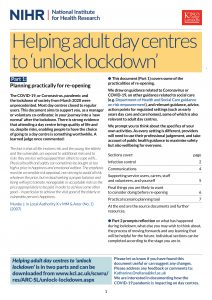
Dr Kritika Samsi

Prof Jill Manthorpe
Kritika Samsi is Research Fellow at the NIHR Policy Research Unit in Health and Social Care Workforce. Jill Manthorpe is Director of the Unit and Professor of Social Work at King’s College London. (1,013 words)
People working in the ARC South London Social Care theme contributed to the first thematic symposium (a webinar meeting) on 17 February 2021, that had the title Inside research: How applied research is tackling health and social care challenges and inequalities in south London – seminar series. The overall theme was Responding to Covid-19 pandemic. We focussed on how we have been Helping adult day centres to ‘unlock’ lockdown. Jill Manthorpe and Rekha Elaswarapu described this with illustrations of the different day centres across South London and some feedback on how our guidance was developed as a unique resource. We then took part in three small groups to discuss the following questions, with Caroline Green, Kritika Samsi and Katharine Orellana also helping with these discussions:
- How are day centres recovering? What helps?
– Is it likely that some may never re-open?
– Do you have any experience or sense of how day centres have coped with the pandemic?
There was general agreement across the three groups that the ARC ‘tools’ or guidance to unlock lockdown were helpful, useful and timely and were more specific than other national guidance. People hoped that day centres will open again once the vaccination programme has been completed, as they provide vital services for many people who are unable to use other community resources. However, in the short term, many observed that their local day centres had not reopened despite being permitted to open, owing to staffing and other logistic problems or perceptions of problems. Day centres for homeless people were reported to have opened first (the ARC research team has completed a small report on some of these).
Questions of funding were raised for centres that are voluntary or community run, as regular fundraising activities that keep them going had stopped. Fund-raising may need to start again but help from local councils and NHS would be welcome. Ideas about how day centres have mobilised fundraising activities to support their work and innovate solutions could be shared across the sector, as well as learning if other community activities such as help with food distribution can be sustained where necessary.
- How could day centres help people to return?
– What do you think has worked or is working?
Many felt that returning to day centres will depend on what is on offer, and how centres that offer support to people who are very vulnerable to infection will have to continue to listen to national guidance. Other centres which have a focus on socializing to reduce loneliness and isolation will need to work on their local ‘PR’ or word of mouth news to reassure people that meeting up is possible. Discussions centred on people being generally stressed so reassurance is needed for people to rebuild confidence that things are getting better. Some people might need to work through the stress and worry about accessing public spaces and the ‘fear factor’ of going to social groups. This could have even greater impacts on people who did not speak English and may not have a big support network, are isolated and won’t be reassured to access services through family and friend networks. Alongside all this, we need to be careful that staff and volunteers don’t get blamed if they don’t get it right.
- Do you think day centres will operate differently in the future?
(e.g. supporting people in new ways, or working with new groups / communities)
A lot of the groups’ discussions focused on the benefits of some technology and the potential for thinking how this could be taken into day centres, rather than just into homes. Suggestions made included design technology, such as touchless light switches, touchless signing-in, signing-out procedures; chatbots for routine support service questions; intensive hygiene equipment and procedures. This needed to be situated alongside the need for groups that may not engage as well with technology, such as people living with dementia, those with hearing difficulties, learning disabilities, English not being a first language, and people who are growing old without any children (amongst others); and many who actually just wanted friendly chat over a cup of tea. A carers’ representative in one group felt strongly that carers mostly wanted a break from the responsibilities of caring while knowing their relative was being looked after and stimulated, and until day centres were fully open, could there be other ways to do this? Many carers worry about scams, and also talk of the lack of motivation for their relatives living with dementia who may be more reluctant to operate virtual devices but enjoy them when they try.
Several people in the larger group felt that moving to a virtual world may help in the short term, we must not forget those that were less ‘digitally connected’: ‘digital exclusion’ being the new term for this, and often associated with living in financial difficulties, having less formal education and very limited access to technology. There was the danger that older people and certain other groups who are the major users of health and social care services are quickly getting marginalised. Moreover, many aspects of face to face communication are also vital to well-being, and more intuitive aspects of communication such as trust cannot be built remotely or virtually to the same extent.
We ended the discussion by wondering whether day centres would move to a more blended or hybrid approach, with some irreplaceable face to face elements being retained, while others being conducted remotely or virtually for those who are able to access a building. Indeed, those with environment hypersensitivities or those with limited mobility or access to transport may welcome a “virtual day centre” for this reason.
As Covid-19 restrictions ease amidst the rollout of vaccination programme, a first valuable step may be to determine what is lost, what has remained and what can be rebuilt in order to reset, rebuild and renew day centre services which evidence shows make a major contribution to many people’s lives.
Kritika Samsi is Research Fellow at the NIHR Policy Research Unit in Health and Social Care Workforce. Jill Manthorpe is Director of the Unit and Professor of Social Work at King’s College London.
